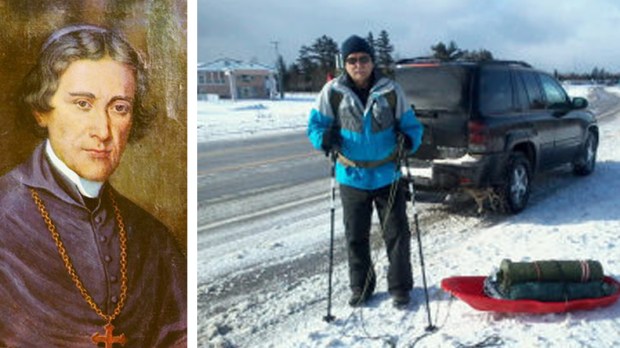What do a 19th-century Slovenian missionary and a 21st-century descendant of Ottawa Indians have in common? They’ve both walked hundreds of miles over the snow during northern Michigan’s harsh winters, motivated by their love for Christ and desire to share their Catholic faith.
Seven years ago, 64-year-old Curtis Chambers of Cheboygan, Michigan, was serving as tribal chairman of the Burt Lake Band of Ottawa and Chippewa Indians and researching his tribe’s history. He came across an 1840 letter written by Venerable Frederic Baraga (1797-1868), the first bishop of the Diocese of Marquette, Michigan. In it, he asks the tribe to show hospitality to a priest he assigned to serve them.
Chambers began reading more and more about Baraga, and was impressed with what he learned: “He was tenacious. The man did not quit. He must have had an incredible faith to come here from Europe in the first place. He didn’t know if he’d be martyred; he trusted in God.”
Baraga is known as the “snowshoe priest,” due to the many miles he’d travel during the region’s hard winters. Chambers, an avid outdoorsman, decided to walk the same routes Baraga once walked, even using the same maps Baraga used.
Chambers was recently a featured speaker at the Diocese of Marquette’s commemoration of the 150th anniversary of Baraga’s death, leaving participants marveling at stories of his travels.
Len McKeen, director of the Bishop Baraga Association,related, “Curtis is amazing. He goes out there in the middle of nowhere, without the aid of modern technological gadgets.”
Chambers typically takes his “Baraga treks” in February (although this year in March), and heads out regardless of the weather. He once walked 30 miles in a single day, but ended the day hyperventilating and hallucinating. Today, he keeps it to 20 miles or less. He’ll walk into a blizzard, but admits “if it’s 20 below zero or less, I’ll stay put for the day.”
This year, he’ll take a “short trip” of only 130 miles. He’ll take with him modest supplies, including his snowshoes, food, a tent and a sleeping bag. The sleeping bag keeps him warm up to 35 degrees below, which along with the tent is a big advantage he has over Bishop Baraga. He explained, “The bishop had only a tarp to put over his head and a blanket to wrap around himself. I feel pretty spoiled.”
Chambers does carry a cell phone for emergencies, although most of the time he is unable to get a signal.
While the pace is grueling, he is able to enjoy beautiful scenery and abundant wildlife. Along the way he enjoys the company of deer, elk, bobcats, coyotes and wolves. Wolves can be dangerous, but as it’s mating season during the winter, “they’re occupied with other things.” Fortunately, the bears are hibernating.
The experiences have taught him much about the bishop, including that “he had to be in incredible shape. It’s extremely strenuous.”
And although Chambers typically walks alone and can go days without seeing another person, he feels the presence of Bishop Baraga with him. “I pray for his assistance all the time,” he said. “I speak to him constantly; I feel a definite affinity to him.”
He’s covered most of Baraga’s Michigan routes, and is now looking to exploring new routes the bishop walked in Wisconsin and Canada.
Although it’s been a rewarding experience, he does not recommend it for the average person. “I’m a woodsman and I train for this sort of thing,” he explained. “It’s nothing someone should do on a whim.”
Read more:
5 Saints who loved the great outdoors
Retired harbor master
Chambers is a retired county harbor master, and one quarter Ottawa Indian. He’s also a devout Catholic, and said the motivation for his unusual hobby is twofold: “I want to demonstrate my love, faith and trust in Our Lord and Savior Jesus Christ, and I want to bring attention to the cause of sainthood for Bishop Baraga.”
The trips have led to a deepening of his faith. “I had no idea that it would change me as it has,” he admitted.
He’s distressed that many young people, including among his tribe, are leaving the Catholic faith. In contrast, he noted, Bishop Baraga “was unbelievably successful as an evangelist. In some of the regions he visited, 100 percent of the Indians converted to Catholicism.”
Chambers lives in Michigan’s Diocese of Gaylord, and his travels are featured on the parish website. He regularly speaks to parishes and schools about his experiences, and one day hopes to write a book about it.
Before he leaves on a trip, he announces to towns and parishes along the route that he’ll be coming, and he’s often met with an enthusiastic response. “Groups will meet me outside of town, hug me and give me lists of things for which to pray,” he said. “It’s very humbling.”

Read more:
List of Saints from the United States of America

